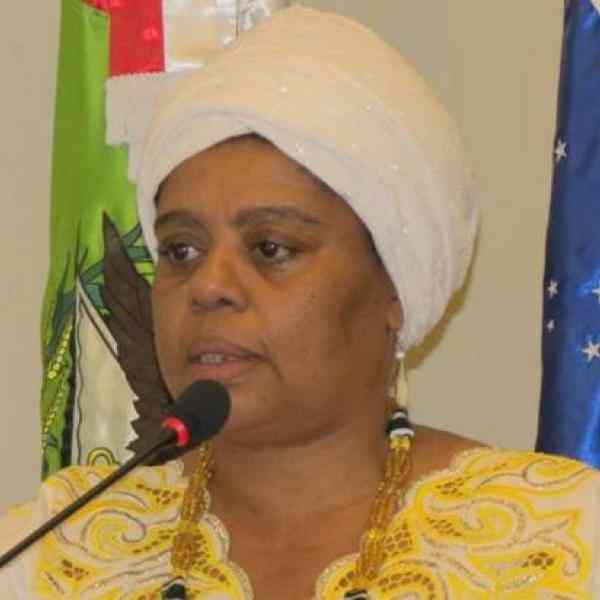Introdução
Convinced that balanced educational experiences will break down prejudices and improve race relations, Jeruse Romão has created an innovative program to get didactic materials on Afro-Brazilian themes into classrooms across southern Brazil.
A nova ideia
Jeruse Romão understands that the process of challenging racial stereotypes and breaking down discriminatory barriers involves concerted efforts over many years. Since images formed in childhood tend to endure, she feels it makes more sense to provide positive racial messages in school than to try to combat the effects of prejudice later in the life cycle. For that reason Jeruse is determined to make sure that children of all ethnic groups have access to accurate materials on Afro-Brazilian history and culture while they are still young and impressionable. Since so few appropriate texts exist, she has created the Center of Reference for Afro-Brazilian Educational Materials, an exchange network that brings together people who design and produce books, games, music and other teaching resources with school systems and individuals who seek learning tools for their classrooms. While the Center itself is the first of its kind in the region, what is truly novel about Jeruse's idea is her plan for producing and disseminating these educational materials as broadly as possible. Over the past few years, since the decentralization of the national school system, she has led the struggle for municipal legislation to oblige local school districts to incorporate Afro-Brazilian themes into educational curricula. At the same time, from her position as education coordinator of the Nucleus for Black Studies, she has been among the principal actors in preparing and gathering didactic materials for elementary and secondary school students, working with teachers' unions to enlist their support. Now Jeruse is reaching out to the private sector, especially successful black business people, appealing to their sense of social responsibility in the hope that they will sponsor the mass production of the materials she assembles. By weaving together contributions from each of the three sectors of society, Jeruse is engineering a comprehensive and effective shift in the attitudes towards race that children develop in school, thereby laying the groundwork for increased opportunity and reduced social tension when they move into adult life.
O problema
In southern Brazil, where the majority of the population consists of descendants of European immigrants, successive federal and state governments implemented "whitening" policies from the 1930s onwards, insisting that "development" and "civilization" could only be achieved by stressing the history and contributions of white settlers, while blacks were to be disparaged and ridiculed as ignorant and backward. The educational system was an important tool in this effort, and textbooks were edited appropriately to emphasize the association of "white" with "progress," while references to Afro-Brazilian culture were erased in an effort to make the black population "invisible." Some progress was made to reverse these trends with the evolution of the Black Movement in the 1960s, but the materials that were produced in the first decades of black consciousness-raising were heavily ideological and polarizing in their content, and therefore not ideal for use as part of a measured and balanced effort to recount both sides of Brazilian history. As a result, prior to the commencement of Jeruse's efforts nearly ten years ago, little if any serious or appropriate educational material on Afro-Brazilian culture found its way into the classrooms of southern Brazil.The bulk of the Afro-Brazilian population is concentrated in the northeastern region of the country, while blacks in the south constitute a minority that is more easily dismissed and discriminated against. Southern schools have contributed to low levels of self-esteem in black students, which is reflected in their extremely high dropout rates–in Santa Catarina state, for example, only one out of four black children who begin first grade will successfully complete fourth, according to statistics gathered by the Nucleus for Black Studies. Low academic achievement subsequently leads to limited employment opportunity, and while some black youths find work as laborers or apprentices to tradespeople, many others turn to delinquency, prostitution, or drug-trafficking to support themselves and their families. Children taught at an early age that they are inferior or inadequate very often come to believe it, adjust their expectations accordingly, and fall prey to self-fulfilling prophecies.
A estratégia
Jeruse's strategy for building the self-esteem of black students, while improving their level of acceptance among their white peers, is built upon the formation of partnerships with key actors from government, business and civil society in the three southern states of Rio Grande do Sul, Santa Catarina, and Paraná. Taking advantage of vocal support from teachers' unions, many of whose members are anxious to incorporate Afro-Brazilian studies into their classes but recognize the paucity of materials, Jeruse has campaigned with municipal governments to encourage them to adopt guidelines for the inclusion of racially-balanced curricula. So far, such laws have been approved in three municipalities, and passage is pending in two others, but Jeruse feels that sufficient momentum has been generated to facilitate similar successes across the region. With legal assistance, she has also taken advantage of federal anti-discrimination laws to have several textbooks removed from local school systems, on the basis of derogatory references to blacks. She plans to continue these efforts, drawing support from student and faculty groups at the state universities, as well as religious and anti-racist organizations, until there is a legislated opening across the region for the introduction of appropriate materials.At the same time, Jeruse is coordinating the compilation of such materials in her role as one of the founders of the Nucleus for Black Studies. She is currently assembling a selection of books, games, videos, newspapers, songs and other educational tools that use creative approaches to teaching black and white students alike about Afro-Brazilian history and culture. During the first semester of 1998, these materials will be distributed to a group of teachers around the region for pilot testing in their classrooms. At the end of that period, they will return the materials to Jeruse, with comments, observations and suggestions based on their experience in the classroom, so that the selection can be edited and modified. Since this plan was first announced in the newspaper Educate: Afro Action, Jeruse has received letters from teachers all over Brazil asking for information about educational resources to use on the subject.Meanwhile, Jeruse has been establishing relationships with influential groups in the business sector to secure funding for the production of these duly tested and edited materials on a broad scale. She is negotiating with the São Paulo Entrepreneurs' Collective, and is particularly hopeful of support from the Afro-Brazilian Business Entrepreneurs' Collective, based in Brasilia. In the past she has received money from the Ford Foundation to survey teachers in Paraná on the topic of resources for Afro-Brazilian studies and is now submitting proposals to the Abrinq Foundation. Jeruse recognizes the importance of enlisting and maintaining the interest and help of progressive elements in the private sector for her overall consciousness-raising strategy, above and beyond the production and marketing of her materials. Such involvement could eventually play a crucial role in improving the quality of education and opportunity for black youth in Brazil.
A pessoa
As the daughter of a teacher, Jeruse was always interested in learning, and though her mother was poor, she made sure Jeruse was able to attend good schools. She was often the only black girl in her classes, and though she was accepted in many ways, also grew up with a profound sense of being different. Jeruse remembers being fascinated at the age of ten by the movie "To Sir with Love," in which Sidney Poitier's character represented her first appreciation of a black man exuding self-respect and a positive outlook. Even her mother, who was by no means submissive, taught her to dress and behave a certain way "because she was black."When she became an elementary teacher herself, Jeruse was deeply influenced by the writings of Paolo Freire and the concept of a distinct "pedagogy of the oppressed." She was first assigned a class of mostly black students who had been rejected as "unteachable" by her more experienced colleagues. However, by using techniques to build up their self-esteem, she was able to make some progress with them and became all the more convinced of the need for appropriate materials and techniques in awakening the latent skills and talents of black children. Subsequent teaching jobs included a stint in a rural school in Amazonia and time in a "constructivist" school for the children of wealthy whites. Impressed by the way the school linked students' affective development to their learning process, Jeruse began to ask herself more insistently why such opportunities shouldn't be available to black children and decided to move from the classroom into a policy/advocacy role by sharing in the founding of the Nucleus for Black Studies. She sees her contribution to the production and dissemination of appropriate materials on Afro-Brazilian culture as the most fitting way to combine her own sense of responsibility as an educated black woman with the need to respond to the crisis of black youth in Brazil.



